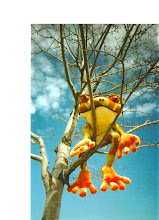Chicago, IL USA:
Facebook has opened doors for me like never before. One of my best friends on this Social Network is Vasile Bagazzoli of Hamilton, Ontario Canada who happens to share with me my LOVE OF ANTS. But where I'm on the Creative End of The Insect by writing 2 Screenplays & Books about them called: iN THE COMPANY OF ANTS ©2009 – whereby I only read about their Lifestyle; watch them infest my Kitchen each Summer; prANTS (that's 'prance' in English) around my home each Summer & imaging what it would be like to be an ANT -- Survivors on a Wild Planet for the last 130 million years, Vasile gets down and muddy with them; he studies, records and videos ANTS and soon, after a few more years of lab work will become 'DR. ANT' himself, following in the footsteps of Dr. E.O. Wilson, one of the world's most outstanding Entomologists.
In order to finish up my 7500 word paper on 'walking iN THE COMPANY OF ANTS ©2009(my Scriptapalooza Quarterfinalist Winner that beat out 3164 other Scripts in July of 2010' into Dreamworks, I asked Vasile 3 very import-ANT Questions of which he answered NOT only in-full, but in such a brilli-ANT manner, I can clearly see how successful Vas will be in all his Entomological Pursuits.
I'd like to share those passages with you now since he was so thorough. That will follow.
AND if you have more questions and/or want to follow Vasile's
ANT's NATION YOU TUBE Videos, they are found on his Facebook Page under:
facebook/com/Vasile.Bagazzoli
and/or: http://www.youtube.com/watch?v=cMKD_nRvzQA
VASILE's ANT ANSWERS FOLLOW:
Hey Adrienne,
I'd love to answer your questions!
"There are MALE ants, right? I know the colony is mostly female run - but there are some that fertilize the eggs, etc. Right?"
Yes. Males do exist, but their only role is to mate with the virgin queens when the time is right and then they die. Males have extremely simple lives where they live in the nest, worker ants (females) feed them and keep them healthy, clean them etc. When the right moment comes these males and the virgin queens use their wings and fly out from the parent nest. They will either mate on the wing (in the air) or/and fly to nearby meadows to mate in the fields. At this time, males will mate with as many females as possible before these females shed their wings. Shortly after, these males will die off and the newly mated queens will begin looking for new suitable places to found their new colonies.
"And, would I be correct in saying: there are AT LEAST 15 colors of ANTS - I need a number. I don't want to GO to high, nor too low!"
It is estimated that theres around ~30,000 different species of ant. The color range is extremely vast, from black, yellow, brown, red, orange, green, blueish, the list can continue to shades. Out of all the research I've done, I haven't really found anything about the number of colors ants could be. It changes so frequently. Some ants are multicolored. I would have to leave that for future science to discover a proper number range!
"And, would you call 'ANTS' territorial 'by nature?"
For the most part, yes. Although it can vary and I don't speak for every species out there, ants are mainly territorial. It would seem to some that they are almost hardwired to attack any intruder to their borders whether it be predator, prey, or passers-by---including neighbouring colonies. Usually neighbouring colonies will fight each other if given the chance. It varies between species and it varies to extremes sometimes. For example, in the deserts of arizona harvester ants collect seeds in the daytime. By noon the sun is too hot for them so they must retreat back into the nest with whatever seeds they can find. This means these ants work extremely hard to forage and collect the seeds on the ground for food. When night falls, a different species of ant begins to forage. They also take a liking to seeds but there are hardly any left due to the harvester ants that collected them during the day. Going to war with another colony can prove extremely exhausting on resources both food and arms, so these ants strategically cover up the nest holes of the harvester ant nests nearby in order to block the entrances. The harvester ants don't forage at night so these ants are able to perform quite the spoiling operation. They then resume collecting whatever they can find. By morning, the harvester ants have an immense job to do before they can even forage and thats to remove all of the debris and pebbles the night ants placed there in piles. By noon, not all the seeds on the ground will be collected which means more for the night ants the following night! This is but one example of the complexity of ant behaviour and territorial behaviour.
IN CLOSING: Thank you, Vasile. The idea of a Population living via Female Control is something that is totally fascinating. Although it takes TWO to Tango, when you're dancing with the Stars, we should study ANTS for tidbits on how to survive; get along and live Life. Exciting Creatures all...you never really know what's happening below your very feet...or do you?
ASK: Adrienne Sioux Koopersmith
Screenwriter - Author – Eventologist
SKiN: Sacred Kinship in Nature ™
How 10 Beloved Plush Toys Redefine Race
Featuring: iN THE COMPANY OF ANTS ©2009
(Beating out 3164 other Scripts in Scriptapalooza’s Intl Screenplay Competition: 2010)
Studio 1437
Chicago - IL USA
Tuesday, 11-22-2011 - 11:24 AM CST
Subscribe to:
Post Comments (Atom)

No comments:
Post a Comment